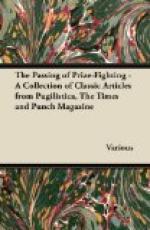Here, then, is an instance of a perfectly indolent man rising higher and higher every year on the ladder of professional advancement. I can only attribute it, my dear laziness, to your beneficent influence, which preserves the great barrister from the weary labours to which his rivals daily submit. They say of him that he knows nothing of law. If I grant that, it merely proves that a knowledge of law is not required for success in the profession of the law. The deduction is dangerous, but obvious, and I recommend it warmly to all who are about to be called to the Bar.
I don’t think I have anything more to say to you to-day; indeed, I know that you would be the last to desire that the writing of this letter should he in any way irksome to me. Besides, it is five o’clock P.M. My arm-chair invites me. I feel tired, and, that being so, I am convinced it would he an act of pedantic folly to deny myself the sweet refreshment of half-an-hour’s sleep. Farewell, kindly one. I shall always rejoice to honour you, and celebrate your praise.
Yours, with all goodwill, Diogenes Robinson.
P.S.—I reopen this letter to say that I have just read in an evening paper a terrible account of the total destruction by a tornado of the town in Canada which was poor TOM’s place of exile. “The loss of life,” it is added, “has been great, and several Englishmen are amongst the victims.” No names are given. Good gracious! If Tom has indeed perished, how am I ever to forgive myself for neglecting him? What must he have thought of me? I curse myself in vain for my—bah! What is the use of telling you this? The same paper informs me, in the elegant language appropriate to these occasions, that “Mr. FIGTREE, Q.C., has been offered, and has accepted, the vacant Lord-Justiceship of Appeal.”




